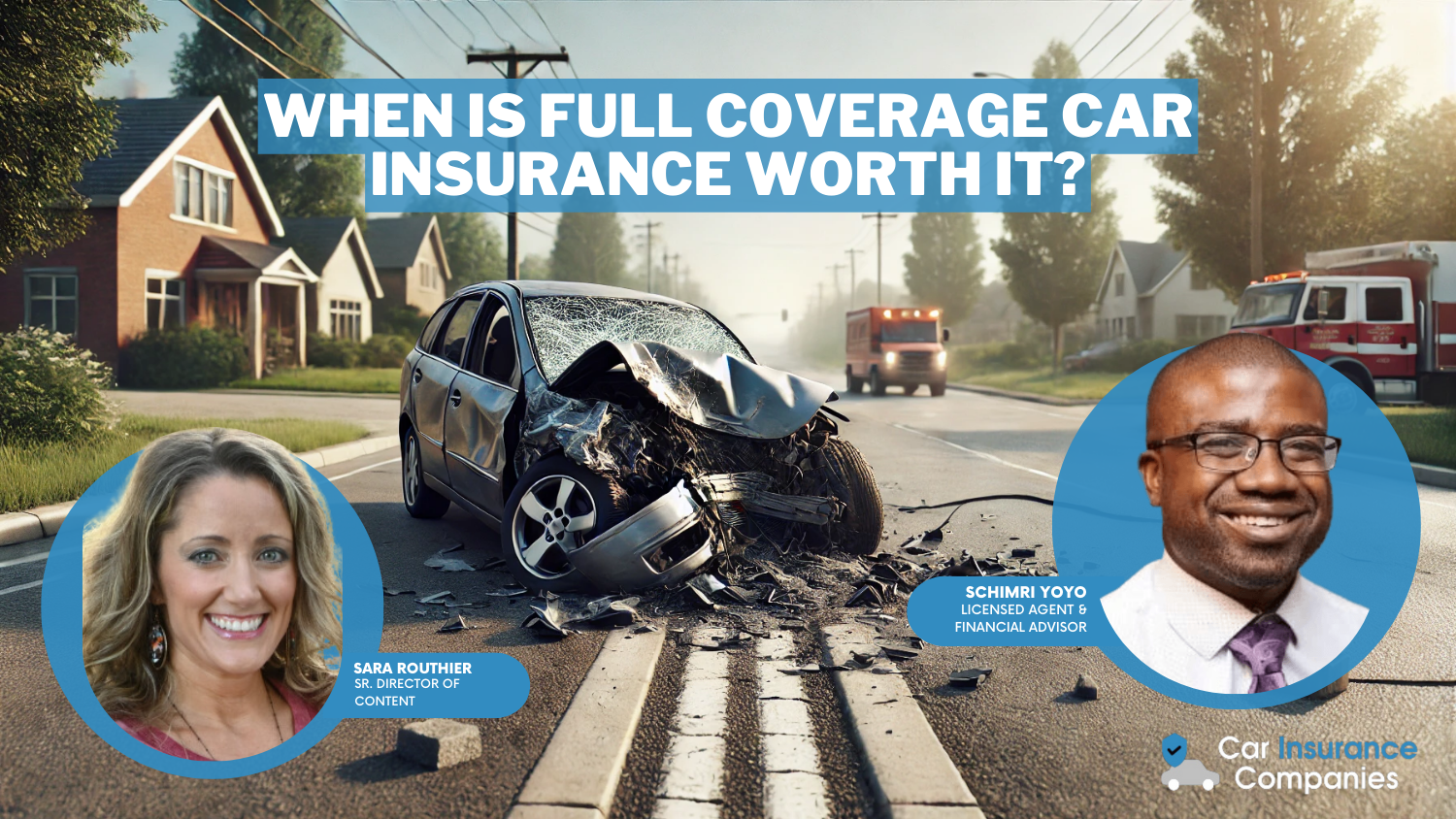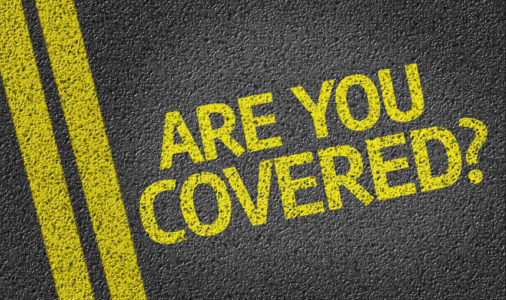When is full coverage car insurance worth it?
Full coverage car insurance is worth it when you're driving a new or financed vehicle, have young drivers on your policy, or if you live in a no-fault insurance state. Full coverage auto insurance provides more than a basic liability policy, and it can save you money in the long run if you happen to be in a car accident. Enter your ZIP code below to find cheap full coverage car insurance quotes from local companies near you.
Read more
Free Car Insurance Comparison
Compare Quotes From Top Companies and Save
Secured with SHA-256 Encryption
Schimri Yoyo
Licensed Agent & Financial Advisor
Schimri Yoyo is a financial advisor with active insurance licenses in seven states and over 20 years of professional experience. During his career, he has held roles at Foresters Financial, Strayer University, Minnesota Life, Securian Financial Services, Delaware Valley Advisors, Bridgemark Wealth Management, and Fidelity. Schimri is an educator eager to assist individuals and families in ach...
Licensed Agent & Financial Advisor
UPDATED: Nov 18, 2024
It’s all about you. We want to help you make the right car insurance coverage choices.
Advertiser Disclosure: We strive to help you make confident car insurance decisions. Comparison shopping should be easy. We are not affiliated with any one car insurance company and cannot guarantee quotes from any single company.
Our car insurance industry partnerships don’t influence our content. Our opinions are our own. To compare quotes from many different car insurance companies please enter your ZIP code on this page to use the free quote tool. The more quotes you compare, the more chances to save.
Editorial Guidelines: We are a free online resource for anyone interested in learning more about auto insurance. Our goal is to be an objective, third-party resource for everything auto insurance related. We update our site regularly, and all content is reviewed by auto insurance experts.
UPDATED: Nov 18, 2024
It’s all about you. We want to help you make the right car insurance coverage choices.
Advertiser Disclosure: We strive to help you make confident car insurance decisions. Comparison shopping should be easy. We are not affiliated with any one car insurance company and cannot guarantee quotes from any single company.
Our car insurance industry partnerships don’t influence our content. Our opinions are our own. To compare quotes from many different car insurance companies please enter your ZIP code on this page to use the free quote tool. The more quotes you compare, the more chances to save.
On This Page
Many people question the need for full coverage car insurance, but there is no doubt that it is worth it to purchase such coverage in most instances. There are few times when you can safely be without full coverage auto insurance.

Every car insurance expert out there recommends that you carry full auto insurance coverage. Car insurance means peace of mind for you, your vehicle, and your savings account; full coverage makes that peace of mind complete.
If you’d like to be fully covered for auto insurance, enter your ZIP code above and compare at least three to four policies today!
- If you want more than just basic coverage, full coverage is all of the other options
- There are several scenarios where full coverage will come in handy
- Factors like your car’s value, bad weather, young drivers, uninsured motorists, and high-risk areas make full coverage a logical and wise choice
Full Coverage Defined
Full coverage is considered to be those car insurance coverage options that are just that: optional. Most states require a certain amount of liability coverage, which is referred to as basic coverage.
Full coverage is defined as all of the other options beyond basic coverage.
First, there is collision. This coverage pays for the repairs for the damages to your vehicle in an accident, regardless of fault. It is the only means to have your car repaired if you cause an accident, outside of paying for it out-of-pocket.
The next part of full coverage is comprehensive coverage. Comprehensive coverage pays for damage to your car that was caused by something other than an accident with another vehicle or object. Examples include falling tree limbs, fire, hitting an animal, or suffering flood damage.
It also covers your losses that result from human hands, such as in the event of vandalism or theft. Comprehensive is also the coverage that will pay to fix windshield damage.
Both collision and comprehensive include a deductible. A deductible is a dollar amount that is your responsibility to pay. Deductible amounts generally range from $250 to $2,000, but the most commonly used deductible amounts are $500 and $1,000.
The higher your deductible, the cheaper the coverage becomes; however, you also will have to pay a higher amount if you suffer a loss.
In the event of a loss, your car insurance company will cover your damages, minus your deductible amount. If your deductible is $500, your car insurance company will pay $2,500 when there is $3,000 worth of damage.
Furthermore, there is also towing and rental car reimbursement. Many drivers overlook these coverage types, but they can be very cost-effective if you ever have to use them. Typically, both are relatively inexpensive to add to a policy.
Towing can range from a few hundred dollars to several hundred dollars if your vehicle is severely banged up. Similarly, a rental car can add a large chunk of change to an accident.
The website WiserDrivers maintains that, on average, most vehicles take two weeks to be fixed and returned to an owner, and rental car costs can add up to $500 or more.
Lastly, other coverage types such as personal injury protection and uninsured/underinsured motorist coverage can also be considered as part of full coverage.
Some states require drivers to carry these forms of coverage, but not all do.
Compare quotes from the top car insurance companies and save
Secured with SHA-256 Encryption
If Your Car Has Value

It is crucial to have full coverage if your vehicle has any significant value. Unless you have a money tree out in your backyard, you probably do not have enough assets to pay for repairs or to replace a car out-of-pocket.
If you have an at-fault accident or suffer a loss through other means, then full coverage is your only recourse to get your car fixed or replaced without opening up your own checkbook.
In fact, most lenders require that you carry collision and comprehensive until the vehicle is paid off to protect the value of the car. Most vehicles continue to have significant value even after they are paid off.
The industry gurus at the National Association of Insurance Commissioners recommend that all vehicles worth more than $1,000 carry full coverage.
You can find the fair market value of your vehicle at websites such as Kelley Blue Book or the National Automobile Dealer’s Association (NADA).
Fair market value takes into account the age, mileage, and condition of your vehicle.
Remember that fair market value doesn’t always work out to cover how much you still owe on your loan. If your vehicle is relatively new, then gap coverage might be a coverage option you should purchase to ensure you have full coverage.
Compare quotes from the top car insurance companies and save Secured with SHA-256 Encryption
If You Have Bad Weather In Your Area
Damages from events other than accidents should be a big concern as well. You should, no doubt, have full coverage if you live in an area that is prone to natural disasters, which can be anywhere in the country.
Hurricanes in the Southeast, snowstorms in the Northeast, earthquakes on the West Coast, and tornadoes in the Midwest all create high-dollar damage to vehicles that are only covered by comprehensive policies.
Furthermore, few areas of the country are spared from the possibility of inclement weather that could cause damage to your vehicle. A falling tree limb or a spat of hail can create thousands of dollars of damage.
Additionally, most parts of the country also have animals that can cause a hazard on the road. Deer, birds, and other wild animals can cause a lot of damage to your car, and no other coverage will pay for repairs except comprehensive.
When A Young Driver Is At The Wheel
Having a young driver in a household is a stressful time, and it is one that you should plan for by having full coverage. According to the Centers for Disease Control, teen drivers are four times more likely to cause a crash.
Furthermore, in 2009, 3,000 young drivers ages 15 to 19 were killed and 350,000 were injured in car accidents.
While teaching responsible driving skills is paramount, being ready for the almost inevitable teen accident is something for which all parents should be prepared.
Teen drivers are most likely to be the cause of dings, dents, and fender-benders, so full coverage is a must.
Compare quotes from the top car insurance companies and save
Secured with SHA-256 Encryption
If You Worry About Uninsured Motorists
https://www.youtube.com/watch?v=xgnL_wBlRVQ
Most people are responsible drivers who follow basic road safety rules and laws. These drivers mainly have to worry about accidents with others.
Full coverage is a must once you understand the risks involved in being in an accident caused by a driver with no insurance.
Though an uninsured motorist may face stiff penalties and trouble finding affordable insurance coverage in the future after causing an accident, the ones who will probably be stuck with the bill of repairing your vehicle are you and your car insurance company.
While it may not be the fairest situation, the best thing that you can do is to be prepared by carrying full coverage.
The experts at the Insurance Information Institute maintain that, while the rate of uninsured motorists has continued to fall over the years, the most recent data for 2009 showed that 13.8 percent of drivers on the road have no car insurance whatsoever.
The Institute also provides a state-by-state breakdown, as you might be sharing the road on a daily basis with even more uninsured motorists than the national average.
If you have a car accident with the roughly one in seven drivers on the road that has no insurance, then you will have to rely on your own coverage to make you whole again.
First, you will want to have uninsured/underinsured motorist coverage. This coverage option is a requirement in many states, but not all states.
Furthermore, you will also want to have collision coverage, as it will fix damages to your vehicle regardless of fault.
Your car insurance company may go after the uninsured driver to recoup your deductible and other costs; so you may break even in the end. While it is indeed unfair that not all drivers carry insurance coverage as they should, the only driver who you can control is yourself.
If You Live In A High-Risk Area

The last reason why you would want to ensure that you have full insurance coverage on your vehicle is if you live in a high-risk area. High risk can mean many things, but it basically equates to a higher likelihood of having to file a claim for a loss.
A high-risk area might be one where car insurance accidents occur at a rate that is significantly higher than normal. Big cities that are notorious for congestion and troublesome traffic are a prime location for having full coverage.
Full coverage is all about protecting you and your investment, so it is smart to have full coverage if you are more likely to be in a car accident.
Furthermore, a high-risk area could also be anywhere that has a high automobile theft rate.
Again, urban areas have higher theft rates, so you need to ensure that you have adequate coverage to ensure that you won’t be stuck paying a car loan on a vehicle that has vanished into a chop shop.
All around, full coverage is the best option for you and your vehicle. Unless you are independently wealthy, full coverage is a must!
Make sure you’re fully covered and start comparison shopping today by entering your ZIP code below!
Compare quotes from the top car insurance companies and save
Secured with SHA-256 Encryption
Schimri Yoyo
Licensed Agent & Financial Advisor
Schimri Yoyo is a financial advisor with active insurance licenses in seven states and over 20 years of professional experience. During his career, he has held roles at Foresters Financial, Strayer University, Minnesota Life, Securian Financial Services, Delaware Valley Advisors, Bridgemark Wealth Management, and Fidelity. Schimri is an educator eager to assist individuals and families in ach...
Licensed Agent & Financial Advisor
Editorial Guidelines: We are a free online resource for anyone interested in learning more about auto insurance. Our goal is to be an objective, third-party resource for everything auto insurance related. We update our site regularly, and all content is reviewed by auto insurance experts.